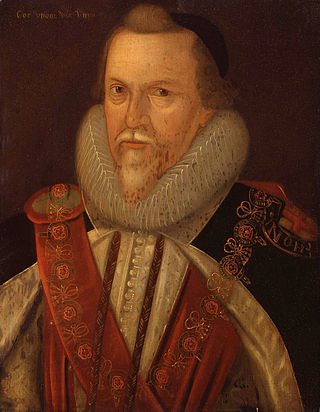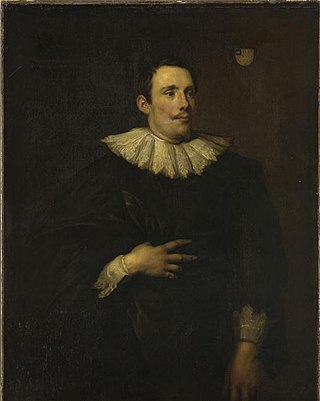Related Research Articles

Thomas Cecil, 1st Earl of Exeter, KG, known as Lord Burghley from 1598 to 1605, was an English politician, courtier and soldier.

The Honourable Richard Bagot was an English bishop.

Lewis Bagot was an English cleric who served as the Bishop of Bristol, Norwich, and St Asaph.
Sir Walter Wagstaffe Bagot, 5th Baronet of Blithfield Hall, Staffordshire was an English Tory politician who sat in the House of Commons between 1724 and 1768.

William Bagot, 1st Baron Bagot, known as Sir William Bagot, 6th Baronet, from 1768 to 1780, was a British politician who sat in the House of Commons from 1754 to 1780. He was then raised to the peerage as Baron Bagot.
Sir Walter Bagot, 3rd Baronet, a barrister and landowner, succeeded to the title 3rd Baronet of Blithfield Hall, Staffordshire, on the death of his father Sir Edward Bagot in 1673.

Walter Bagot was an English cleric and landowner. He was the third son of Sir Walter Bagot of Blithfield Hall, Staffordshire.

William Paulet, 3rd Marquess of Winchester was an English nobleman, the son of John Paulet, 2nd Marquess of Winchester and his first wife, Elizabeth Willoughby. His maternal grandfather was Robert Willoughby, 2nd Baron Willoughby de Broke.
Sir William Armine, 1st Baronet was an English politician who sat in the House of Commons at various times between 1621 and 1651. He supported the Parliamentary cause in the English Civil War..
Elizabeth Paulet was an English noblewoman, the daughter of John Paulet, 2nd Marquess of Winchester of Basing, Hampshire and his first wife Elizabeth Willoughby.

Thomas Gerard, 1st Baron Gerard was a Staffordshire and Lancashire landowner and politician, a member of six English parliaments for three different constituencies. Although a prominent member of the Essex faction in the reign of Elizabeth I, he avoided involvement in the Essex Rebellion and received greater honours, including a peerage, in the reign of James I.
Thomas Tasburgh, originally of South Elmham, Suffolk, afterwards of Hawridge and latterly of Beaconsfield and Twyford, Buckinghamshire, was a member of the English landed gentry, a magistrate, member of parliament, High Sheriff of Buckinghamshire, and officer of the Exchequer to Queen Elizabeth I.

Sir William Courtenay of Powderham in Devon was a prominent member of the Devonshire gentry. He was Sheriff of Devon in 1579–80 and received the rare honour of having been three times elected MP for the prestigious county seat (Devon) in 1584, 1589 and 1601.

Sir William Courtenay was a landowner in Devon and de jure 2nd Earl of Devon. He was the son of George Courtenay and Catherine, daughter of Sir George St Ledger of Annery. He succeeded his grandfather Sir William Courtenay, of Powderham in 1535. He was knighted in 1553 and MP for Plympton in 1555.

Sir Edward Littleton was a Staffordshire landowner, politician and rebel from the extended Littleton/Lyttelton family. A supporter of Robert Devereux, 2nd Earl of Essex, he was the victim of a notorious electoral fraud in 1597 and a participant in the Essex Rebellion, although he escaped with his life. In the reign of James I he was elected a member of the parliament of England.
Richard Broughton (1542–1604), of Lower Broughton and Owlbury, Bishop's Castle, Shropshire, was an English politician and judge.
Thomas Darcy, 1st Earl Rivers was an English peer and courtier in the reigns of Elizabeth I, James I and Charles I.

John Peryam, of Exeter, Devon, was elected four times as a Member of Parliament, for Barnstaple 1584, Bossiney 1586, Exeter 1589 and 1593. He served as Mayor of Exeter. He was the younger brother of Sir William Peryam (1534-1604) of Little Fulford, near Crediton in Devon, Lord Chief Baron of the Exchequer.

Sir John Strode, of the Middle Temple, London and Chantmarle, Cattistock, Dorset, was an English MP for Bridport in 1621 and 1625.

John Strode, the son of Robert Strode of Parnham, Dorset and Elizabeth Hody, was elected MP for Dorset in 1572 and was Sheriff of Dorset from 1572 to 1573.
References
- ↑ 'BAGOT, Walter (1557-1622), of Blithfield, Staffs', The History of Parliament: the House of Commons 1558-1603, ed. P.W. Hasler, 1981.
- ↑ 'CECIL, Thomas (1542-1623), of Burghley House, Lincs. and Wimbledon, Surr.', The History of Parliament: the House of Commons 1558-1603, ed. P.W. Hasler, 1981.
- ↑ Courtney Erin Thomas, If I Lose Mine Honour I Lose Myself (Toronto, 2017), pp. 182-4: The padding was 'cotton layed and doubled aboute her bellye', see FSL L.a.355 (1).
- ↑ Folger Luna, L.a.355 (2), 'Letter from John Chadwick to Walter Bagot'.
- ↑ Folger Shakespeare library, Bagot family papers.
- ↑ William Bagot, Memorials of the Bagot Family (Blithfield, 1824), pp. 53-4.